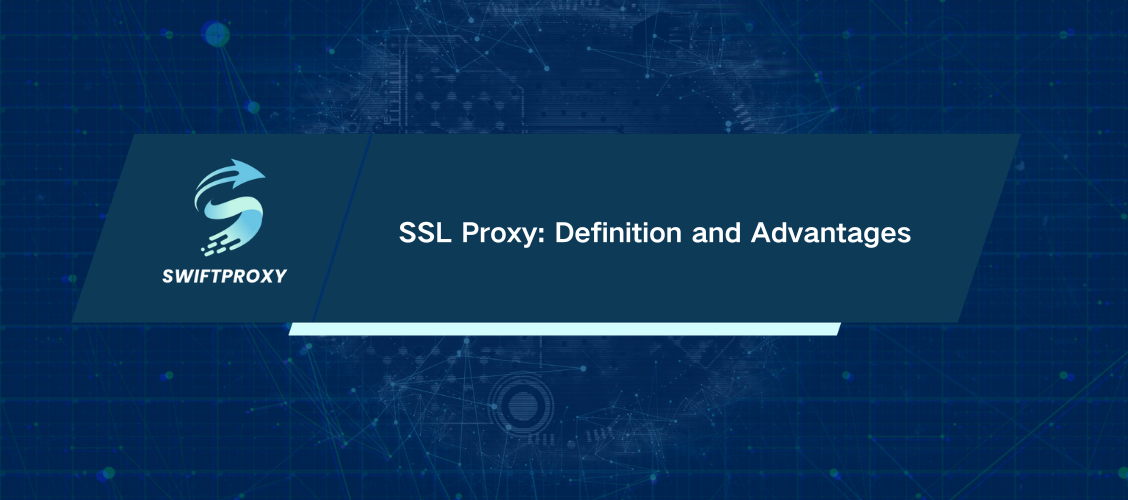SSL Proxy: Definition and Advantages

It's quite possible you're already familiar with proxy servers and might even distinguish between datacenter proxies and residential proxies. But have you encountered SSL proxies? What sets them apart from other types? In this article, we'll delve into what makes SSL proxy servers unique in the world of proxies.
To begin with, SSL/HTTPS proxy types belong to a category of proxies identified by the specific protocol used for online connections. Another example within this classification is the SOCKS5 proxy type. Now that we've covered the classification, let's focus on the main topic at hand.
SSL Proxy Definition
SSL proxy is a type of proxy server that utilizes the Secure Socket Layer (SSL) protocol, often referred to as SSL proxy server. It handles encryption and decryption between the client and server, ensuring that neither can detect the proxy's presence.
Furthermore, an SSL proxy, also known as an HTTPS proxy, stands for Hypertext Transfer Protocol over SSL. In essence, it is a proxy server that utilizes the HTTP protocol over SSL. Presently, HTTPS protocol is widely adopted as the standard for most websites and online services. The rationale behind this is straightforward — HTTPS guarantees a heightened level of privacy and security. How does it accomplish this? Let's delve into it.
What is the operational mechanism of an SSL proxy?
The key point lies in encryption. As mentioned earlier, HTTPS proxy servers use SSL to encrypt all data transmitted between an endpoint and any external server you wish to access. Technically, this process mirrors connecting to a standard SSL-certified website. SSL encryption ensures that your connection remains secure from interception, and modern browsers issue warnings if you attempt to connect to a site lacking an SSL certificate.
What advantages does an SSL proxy server provide?
SSL proxies offer two significant advantages, both deriving from encryption: enhanced overall safety and increased anonymity.
1. Improved security with SSL proxies
SSL proxies provide enhanced security by encrypting the connection between your device and the target server through a protective SSL certificate layer. This encryption ensures that even if the traffic is intercepted, attackers have virtually no chance of accessing the information, which is crucial for safeguarding sensitive communications, such as accessing confidential corporate documents remotely.
2. Improved anonymity with SSL proxies
Due to encryption, SSL proxies enhance anonymity significantly. While regular HTTP proxies offer reasonable anonymity, SSL proxies provide an additional layer of security by eliminating the risk of data interception leading to identification.
In contrast to HTTPS, which encrypts traffic, the older HTTP protocol does not encrypt data during transmission, leaving it readable and vulnerable to interception by third parties. This vulnerability is frequently exploited in man-in-the-middle (MitM) attacks. MitM attacks are a significant threat, as noted in IBM's X-Force Threat Intelligence Index , where a considerable number of exploits targeting inadvertent weaknesses involved MitM attacks.
What are the practical applications of SSL proxies?
Despite offering greater security and anonymity, SSL proxies share similar use cases with other types of proxies. To reiterate, these include:
Social media account management
For legitimate marketers, managing multiple accounts from the same IP address can be cumbersome. To address this challenge, many social media management platforms rely on proxies to assist marketers and social media managers in creating and managing accounts effortlessly.
Crawling web data
The internet provides an abundant source of valuable public information for a wide range of stakeholders. However, gathering this information extensively is more challenging than initially perceived. Many popular targets for web scraping automatically hinder large-scale data collection by blocking IP addresses that exceed normal request rates. Using rotating SSL proxies in web scraping enables circumvention of these restrictions imposed on data access freedom.
Protecting the brand
Cyber attacks and intellectual property theft can inflict significant harm on businesses, including financial repercussions, client attrition, and damage to the brand's reputation. SSL proxies play a crucial role in safeguarding brands by bolstering network security, filtering out malicious emails, assisting in monitoring internal internet usage, and providing additional protective measures.
Verification of advertisements
Hackers and fraudsters employ advanced techniques to manipulate ad traffic, resulting in a significant portion of advertisements being unseen by legitimate users and causing substantial financial losses for businesses. Consequently, more companies are turning to proxies for ad verification purposes. This approach helps in identifying fraud, enhancing ad effectiveness, and anonymously evaluating advertisers' landing pages.
Final Summary
SSL proxies are the preferred option for businesses prioritizing privacy and security. With their versatility and wide range of applications, they prove invaluable for achieving tasks efficiently. At Swiftproxy, our residential proxy network allows you to securely communicate with websites using HTTPS, ensuring the highest level of privacy and security during your operations.
For more information on integrating Swiftproxy's SSL proxies into your proxy infrastructure, please visit swiftproxy.net, register now, or schedule a consultation with our sales team!

















































